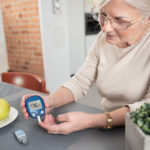By David Blyweiss, M.D., Advanced Natural Wellness
October 19, 2016
- Put an end to yo-yo dieting
- Have you become resistant to weight loss?
- Drop pounds while eating all of the food you want
You don’t have to starve yourself to lose weight. You don’t have to count calories, worry about portion size or eat boring foods either.
Nonetheless, these are exactly the things that most folks do when they go on a diet. It’s also why so many people end up rebounding – gaining their weight back soon after they lose it.
This can turn into a vicious cycle of yo-yo dieting. And if this sounds anything like your weight loss efforts, I’m here to tell you that you CAN turn things around.
Let me explain what happens when you deprive yourself of food.
When you cut calories for extended periods of time, it can severely affect your metabolism. It sends your body into “starvation mode”, telling it to conserve energy. This means you stop burning as many calories as you normally would. There are reasoned lines of thinking that show when you fool your thyroid gland into decreasing metabolism it finds it difficult to get back on track, especially if you’re now deficient in critical nutrients/minerals it needs to actually make thyroid hormone.
Additionally, you don’t just lose pounds of fat when you diet. You also lose muscle mass.
Open your arteries, improve blood flow for a new health miracle...
Did you know your circulatory system has over 60,000 miles of arteries, veins and other blood vessels, if stretched end to end?
But as you age, your blood vessels undergo changes, which may cause them to stiffen, thicken and get clogged.
GOOD NEWS! Doctors have now identified a “Miracle Molecule” inside your arteries that helps OPEN your arteries and IMPROVE blood flow.
It’s what Dr. Valentin Fuster calls it, "One of the most important discoveries in the history of cardiovascular medicine."To you, that means...
- Healthy blood pressure
- Sharper mind and memory
- Skyrocketing energy and muscular strength
- Increased pleasure and passion in the bedroom
- Improved circulation to every cell and organ in your body
Go here to discover a new natural way to significantly boost the levels of this miracle molecule in YOUR body NOW!
Well, muscle burns more than twice the calories that fat does. So when you eventually increase your caloric intake back to normal, the combination of a sluggish metabolism and lower muscle mass will both work against you.
These changes are only part of the reason it’s tough to keep weight off after you’ve lost it.
Are You Weight-Loss Resistant?
Two of the most important hormones when it comes to your waistline are insulin and leptin. However, when you overproduce either of these hormones, your body becomes resistant to their activity.
And when you yo-yo back and in forth in your dieting efforts, it can really throw them and your thyroid gland out of whack.
Insulin is often called your “fat hormone”. That’s because it determines how much fat your body stores or expends.
Leptin is more of a fat regulator. It tells you when you’re hungry and whether or not your body has enough fat stored. So it deals more with hunger and satiety signals.
Now, the only way you’re going to reduce your intake of calories for extended periods of time is to not get hungry. But if obesity and failed weight loss efforts have made you leptin resistant, it can no longer regulate your hunger. (This may be why so many dieters end up binging long before they’ve achieved their goals.)
Insulin works in a similar manner. When you become insulin resistant, it hinders your body’s ability to use fat for energy. Thus, your fat cells grow larger and larger, making it very difficult to drop those excess pounds.
The World's Quickest Solution for Ending Prostate and Urinary Misery
This has recently been revealed to be one of the only real breakthroughs in prostate health.
The seeds of a strange fruit (sometimes called "Chinese Apples") hold powerful phytonutrients that are a revolution in prostate health.
In fact, UCLA and Veterans Administration research have now proved this to be true.
Not only that, but it may be the worlds quickest solution for ending prostate misery.
Simply stated, these phytonutrients represent a huge step beyond beta sitosterol, saw palmetto, and other phytosterols alone.
Simply click HERE if you want to have fast prostate relief...restful, uninterrupted sleep...no more constant "urges to go"...enhanced virility...and optimal prostate support for life.
Eat all the Food you want and STILL Lose Weight
The truth is counting calories is a poor way to try and lose weight. It’s much more important to focus on the nutritional value of the calories you’re eating.
Here’s a perfect example: You could eat 21 artificially processed Cheetos®. Or you could choose to eat 21 almonds.
Both provide the same number of calories. But which one do you think is going to fuel your body with healthy fats, satisfy your hunger and leave you feeling fuller?
If you want to permanently drop pounds without ruining your metabolism and disrupting your hormones, questions like this are the ones you need to consider. So let’s make it simple…
Make fresh, organic, nutrient-dense and antioxidant-rich veggies the focal point of your meals. Fill in the rest with a small amount of healthy fats, along with clean-sourced proteins. General rule of thumb: 87% of your meals should be plant-based, and only about 13% should come from animal proteins.
It’s also a good idea to enjoy at least one raw veggie meal per day to get an extra burst of nutrients. Think hummus and tabouleh with mixed vegetables… or maybe a fresh salad of baby greens.
Then choose fruits, nuts and other plant-based foods for snacking.
If you eat like this 90% of the time, you’ll automatically be eating your way to weight loss. The other 10% of the time eat some of the foods you enjoy so that you don’t feel “cheated”.
When you follow this eating pattern, you’ll never have to worry about calories or portion size. Just load up your plate and enjoy your meals. The antioxidants, phytonutrients and other health-promoting compounds in these natural foods and will all work together to stabilize your metabolism and hormones.
At the same time, move, move, move!
Skip the endurance training and go for high intensity interval training to build strong muscle more quickly.
Exercises like squats and lunges go to work immediately to strengthen your largest muscle groups. Perform a set of 10 or 20 of these exercise at a time, and then take a minute or two to recover. Repeat, rest, and repeat again.
This will help promote after-burn and so that you’ll automatically burn more fat while you’re resting.
Also, getting enough rest is just as important as getting your exercise. Poor sleep is linked to disruptions in both insulin and leptin metabolism.
SOURCES:
Johannsen DL, et al. Metabolic slowing with massive weight loss despite preservation of fat-free mass. J Clin Endocrinol Metab. 2012 Jul;97(7):2489-96.
Crujeiras AB, et al. Weight regain after a diet-induced loss is predicted by higher baseline leptin and lower ghrelin plasma levels. J Clin Endocrinol Metab. 2010 Nov;95(11):5037-44.
Strohacker K, et al. Adaptations of leptin, ghrelin or insulin during weight loss as predictors of weight regain: a review of current literature. Int J Obes (Lond). 2014 Mar;38(3):388-96.
Fuhrman J, et al. Changing perceptions of hunger on a high nutrient density diet. Nutr J. 2010 Nov 7;9:51.
Kim TW, et al. The Impact of Sleep and Circadian Disturbance on Hormones and Metabolism. Int J Endocrinol. 2015; 2015: 591729.







